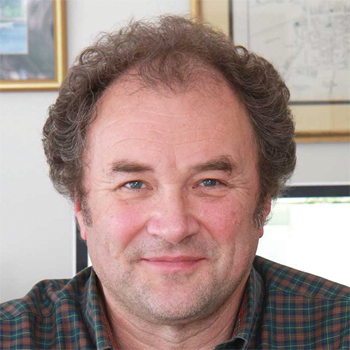Tonks honored for seminal work on protein tyrosine phosphatases
, the Caryl Boies professor of cancer research at Cold Spring Harbor Laboratory, has won the ��������’s 2019 Earl and Thressa Stadtman Distinguished Scientist Award for his three decades of outstanding research in the field of protein tyrosine phosphatases, or PTPs, enzymes that regulate the signal transduction cascades of many cellular processes.

“I am honored to receive this award, which I hope will help to draw attention to all of the outstanding research being performed on the PTP family of enzymes. These are exciting times as new biological functions and links to disease are being defined for the PTPs. Hopefully, we will soon witness the first drugs that target these enzymes for the treatment of major human diseases.”
— Nicholas Tonks
Bruce Stillman, president and CEO of Cold Spring Harbor Laboratory, nominated Tonks, calling him “a pioneer and a consistent leader in the field.” of the Medical Research Council Laboratory of Molecular Biology wrote in support of the nomination, “Tonks is a member of a select group of scientists responsible for establishing and developing a new research field of immense importance and significance.”
Tonks received a bachelor’s degree in biochemistry from Oxford University in 1981 and a Ph.D. from the University of Dundee in 1985, working with Sir .
Little was known about tyrosine dephosphorylation when Tonks started his postdoctoral work with at the University of Washington, where Tonks discovered and characterized the first PTP, known as PTP1B. Tonks and collaborators also showed that the membrane-spanning lymphocyte common antigen CD45 was a PTP, advancing the field of immunology.
After Tonks joined the faculty at Cold Spring Harbor in 1990, his lab showed that PTEN, the major tumor suppressor protein mutated in many cancers, had PTP activity, and he characterized further the importance of its lipid and protein phosphatase function. Throughout his independent career, Tonks has advanced the PTP field in diverse cellular pathways.
His lab helped lay the groundwork for PTP1B as a therapeutic target for a range of human diseases. In collaboration with others, they determined the crystal structure of PTP1B, deciphering the mechanisms of PTP catalysis and substrate recognition, and then designed substrate-trapping mutants that other researchers used to identify physiological PTP substrates.
In their second decade, Tonks’ team discovered how PTP1B is regulated: Hydrogen sulfide, a gaseous signaling molecule with membrane permeability, regulates PTP function as part of the unfolded protein response to endoplasmic reticulum stress, an essential process implicated in many diseases. They also discovered that PTPs can be inactivated reversibly by oxidation and developed methods to assay PTP redox state. This mechanism plays a role in insulin signaling, providing a therapeutic target for diabetes.
Tonks has pursued the therapeutic potential of his discoveries. His lab showed that small molecule inhibitors of PTP1B could have therapeutic use for Rett syndrome, and he led an early-stage human trial to show that PTP1B allosteric inhibitor MSI-1436 (trodusquemine) is a therapeutic target for HER2-positive breast cancer.
“Nick Tonks has been a major figure in biochemistry and signal transduction for nearly 30 years,” of New York University wrote in a letter supporting the award nomination. “He shows no sign of slowing down, and indeed, his most important work may yet be to come.”
Enjoy reading ASBMB Today?
Become a member to receive the print edition four times a year and the digital edition monthly.
Learn moreGet the latest from ASBMB Today
Enter your email address, and we’ll send you a weekly email with recent articles, interviews and more.
Latest in People
People highlights or most popular articles

Cedeño–Rosario and Kaweesa win research award
The award honors outstanding early-career scientists studying cancer, infectious disease and basic science.

ASBMB names 2026 award winners
Check out their lectures at the annual meeting in March in the Washington, D.C., metro area.

Peer through a window to the future of science
Aaron Hoskins of the University of Wisconsin–Madison and Sandra Gabelli of Merck, co-chairs of the 2026 ASBMB annual meeting, to be held March 7–10, explain how this gathering will inspire new ideas and drive progress in molecular life sciences.

Castiglione and Ingolia win Keck Foundation grants
They will receive at least $1 million of funding to study the biological mechanisms that underly birds' longevity and sequence–function relationships of intrinsically disordered proteins.

How undergrad research catalyzes scientific careers
Undergraduate research doesn’t just teach lab skills, it transforms scientists. For Antonio Rivera and Julissa Cruz–Bautista, joining a lab became a turning point, fostering critical thinking, persistence and research identity.

Simcox and Gisriel receive mentoring award
They were honored for contributing their time, knowledge, energy and enthusiasm to mentoring postdocs in their labs.

